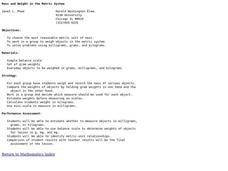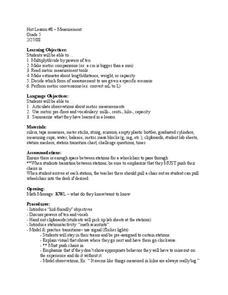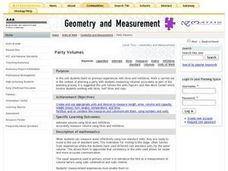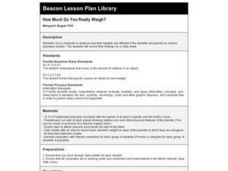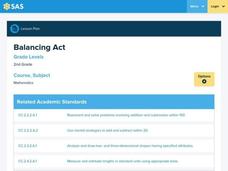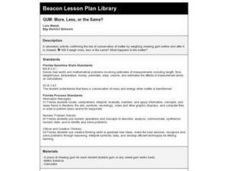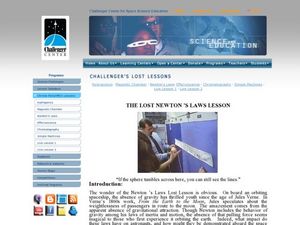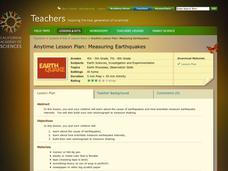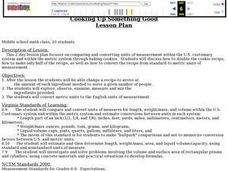Curated OER
How Do Your Students Measure Up?
Students participate in a paper folding activity that has them create a ruler for measuring to the closest 1/16th of an inch.
Curated OER
Spaced Out
The students are able to use a formula to calculate the volume of cuboids by measuring the length of each of the three dimensions. They also investigate the relationship between milliliters and cubic centimeters.
Curated OER
Estimation Challenge
Students calculate the length of the classroom using non-standard units of measurement and estimation. Using a cracker box, they discuss measuring various objects in the room as a class, and independently estimate and measure the length...
Curated OER
Mass and Weight in the Metric System
Students weigh and record the mass of various objects, and then compare the weights of objects by holding gram weights in one hand and the object in the other hand.
Curated OER
Weighing stations
Students work at a variety of stations involving practical measuring tasks. Estimation skills and the ability to measure accurately using kilograms and grams are developed.
Curated OER
Measurement
Fifth graders complete measurement problems where they use powers of ten, read metric measurement tools, estimate measurements, and more. In this measurement lesson plan, 5th graders complete 10 problems.
Curated OER
Party Volumes: Measurement
Second graders explore liters and milliliters. They estimate volume and accurately measure the volume. Students plan a party and measure volume using liters and milliliters as part of the planning process.
Curated OER
Mass and Weight
Students explore the science topics of mass and weight. In this mass and weight lesson, students determine the difference between mass and weight as they discuss the definitions and the application the definitions.
Curated OER
How Much Do You Really Weigh?
Sixth graders check to see how their weights differ if they weighed themselves on different planets. They record their findings on a data sheet.
Curated OER
Activity #6 'Nothing' Matters: A Demonstration
Learners observe the 'pouring' of a gas. They compare the masses (weights) and densities of two gases. Pupils define the following terms: matter, mass, and density. Students answer questions after watching the demonstration.
Curated OER
Physics and Me
Sixth graders compare and contrast mass and weight. In this physics lesson, 6th graders calculate speed given distance and time information. They construct a rocket and relate this to Newton's 3rd Law of motion.
Curated OER
Balancing Act
Second graders identify the attributes of various shapes and estimate the weight of the objects. In this geometry lesson, 2nd graders identify the attributes of concrete objects and use a pan balance to weight them.
Curated OER
GUM: More, Less, or the Same?
Students confirm the law of conservation of matter by weighing chewing gum before and after it is chewed.
Curated OER
Water Cycle Stories
Students explore the water cycle and associated phase changes. They predict what happens to the mass of an ice cube in a Ziploc bag, discuss and act out phase changes and diagram the water cycle.
Curated OER
Are You My Little Peanut?
Fourth graders explore the mass and length of peanuts by pretending to parent a peanut. In this mode, median and range lesson students graph their measurements and then use them to find the mode, median and range. Students discuss peanut...
Curated OER
The Lost Newton's Laws Lesson
Students explore momentum. In this physics lesson, students perform an experiment in which two balls are released on slanted boards while students observe which ball will go the farthest and the fastest. Students define and explain...
California Academy of Science
Measuring Earthquakes
After a brief discussion on earthquakes, make a makeshift seismograph to record the shaking of the table that it sits upon. While the background information will be useful to you as a teacher, the seismograph does not seem like it would...
Curated OER
Friction and Gravity
Seventh graders identify the factors that determine the strength of the friction forces when two objects push against each other. Describing the difference between weight and mass, they participate in experiments. They state the law of...
Curated OER
Forces and Graphing
Learners analyze graphs to determine relationships between variables and rates of change. They determine the basic concepts about static reaction forces. They determine the slope and equation of a line.
Curated OER
Paper Packaging Design
Students create packages with a maximum capacity. In this geometry activity ,students estimate using whole numbers, decimals and fractions. They calculate length, weight and mass of packaging.
Consortium for Ocean Science Exploration and Engagement (COSEE)
Ocean Acidification: Whats and Hows
Open this lesson by demonstrating the production of acidic carbon dioxide gas by activated yeast. Emerging ecologists then experiment with seashells to discover the effect of ocean acidification on shelled marine organisms. They measure...
Curated OER
Cooking Up Something Good
Students compare and convert units of measurement within the United States customary system and within the metric system by baking cookies. Students discuss how to double the cookie recipe, how to make only half of the recipe, and how to...
Michigan State University
Gases Matter
Young scientists learn that seeing isn't necessarily believing when it comes to the states of matter. After performing a fun class demonstration that models the difference between solids, liquids, and gases, children complete a series of...
Curated OER
Too Heavy For Me
Students explore the different arrangement of air molecules in high and low air pressure masses. They compare the temperature of high and low pressure masses and discover how a barometer works.



